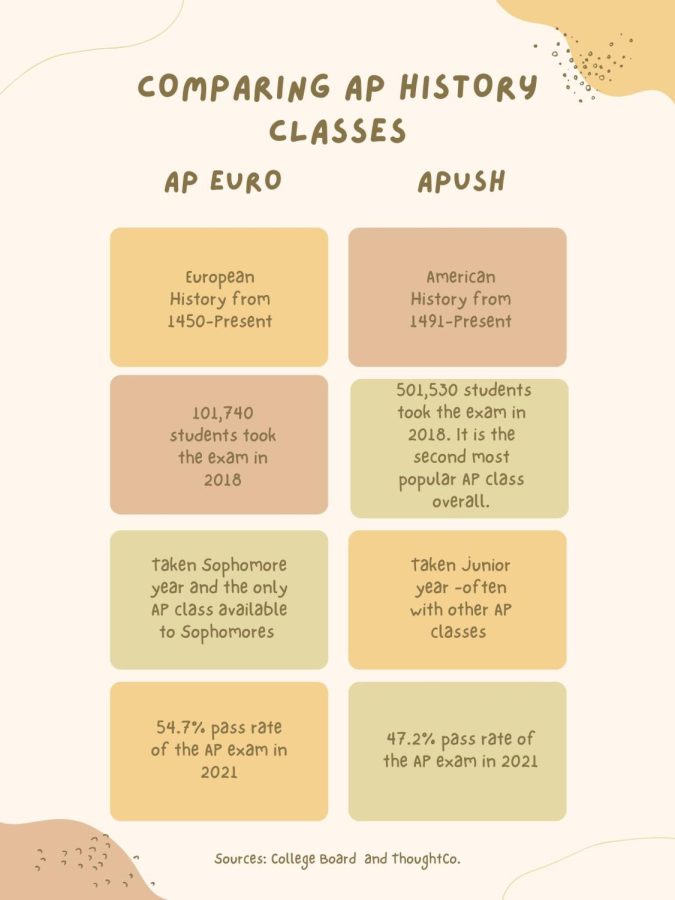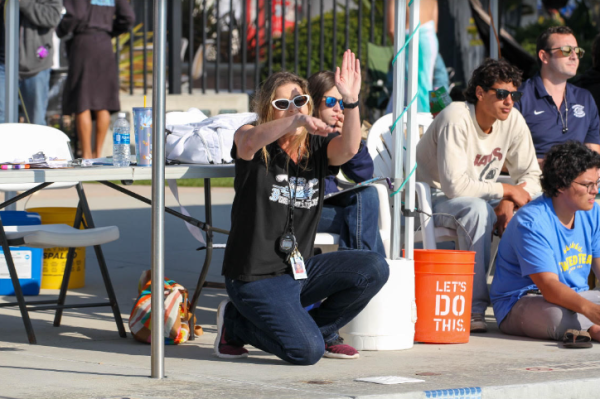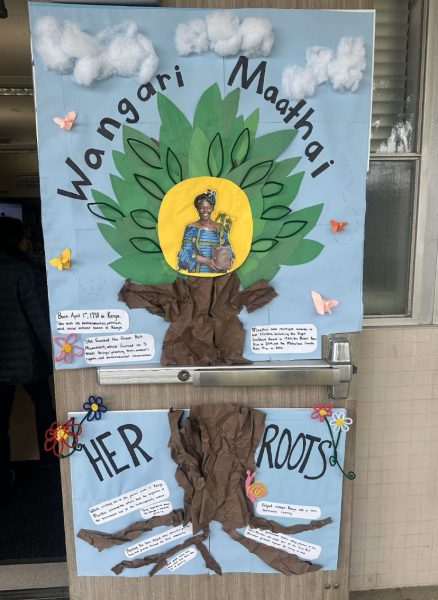The opportunities, obstacles of taking AP History classes: a comprehensive guide
College history for high schoolers. For students considering or registering for AP History classes like APUSH and AP Euro, the thought of taking these classes can be overwhelming. However, for those who take the risk and find success, they can gain a wealth of new skills and knowledge. “I am glad I took this class,” AP Euro student Shai Daniels said.
With the school year coming to a close, many students are starting to think seriously about the classes they signed up for next year. For those who signed up for AP History classes, this prospect can be intimidating. With many uncertainties and fears, students may wonder if they will be able to persevere through the journey.
Chapter 1: What is an AP class?
Advanced Placement classes, or AP Classes, are college level classes offered to high school students. These fast paced courses teach you two semesters worth of curriculum in about a semester and a half. This is for the purpose of taking a test at the end of the year to demonstrate your knowledge. AP European History teacher Barbara Harvey explained that the course work for AP History class can greatly differ from a traditional class.
“It is more rigorous, there is more reading, there is more homework, and it is not about memorization of names, dates and people,” Harvey said. “It is about thinking about events and how they relate and influence each other.”
If students give it a serious shot, at the end of the year, they learn a lot of history, but they also gain some skill and become stronger students.
— Norma Saatjian
Chapter 2: An Overview of AP Euro and APUSH
AP History classes are often considered some of the more rigorous AP classes available at Buena. What do these classes entail?
AP Euro:
AP Euro, officially titled AP European History, covers European history in the time period of 1450 to the present. This course is often taken by students in their sophomore year and is the only AP class available for sophomores. It is praised for its ability to prepare students for APUSH their junior year as the format of the class is very similar.
APUSH:
AP United States History, or more commonly known as APUSH is an AP class that covers American History in the time period from the Ice Age to Ronald Reagan in the 1980s. Students will take this course their junior year, sometimes alongside other AP courses.
The Test:
Both of these classes have the same test format which includes a series of multiple choice questions, short answer questions, a long essay question, and a document based question. Junior Marilyn Carlos was studious in her approach to the APUSH test by taking advantage of in-class review, going to office hours, and watching recommended videos.
“I was definitely really nervous, but I think I was prepared,” Carlos said.
Chapter 3: Why take an AP History class?
AP classes like APUSH and AP Euro can help you save time and money in college. If you pass the test you can get college credits, and sometimes you are able to skip certain general education classes. On top of that, APUSH teacher Norma Saatjian explained how these classes will give you a wealth of knowledge and time management abilities.
“If students give it a serious shot, at the end of the year, they learn a lot of history, but they also gain some skill and become stronger students,” Saatjian said.
Chapter 4: Is an AP History class right for me?
Harvey explained that AP History classes are not always the right choice for everyone, and they are in no way indicative of a student’s ability to be successful.
“You can go to college without going to AP Euro,” Harvey said. “It is not the ‘be all and end all’. It is the beginning of a long interaction with college level courses, and if this isn’t the right time or if they aren’t ready for it, that is perfectly fine.”
These classes are a large time commitment, thus if you have a busy schedule with sports or a job, having to balance these commitments and the required homework can be difficult. Sophomore Vincent Gilbert is an avid athlete and found balancing AP Euro with his sports to be difficult at times.
“It is the first class [where] you do not get an ‘A’ easily,” Gilbert said.
I feel like the class created a family. We all bonded with each other because we were all struggling.
— Daniels
Furthermore, if you have never taken an AP class before, it can be hard to figure out how to adapt to these classes. Saatjian explained how students taking these courses typically struggle at the beginning of the year.
“Students need to know this. For a student who is new to AP, it really takes a quarter to get used to the pace and the stress,” Saatjian said. “It breaks my heart every year that students panic and jump ship where it really takes a solid quarter for you to learn how to manage it.”
But do not be discouraged. Many students who enter these classes come out the other side as stronger students. Sophomore Shai Daniels explained that she was glad to have taken AP Euro and feels that the friendships that she made were an added positive.
“I feel like the class created a family,” Daniels said. “We all bonded with each other because we were all struggling.”

















